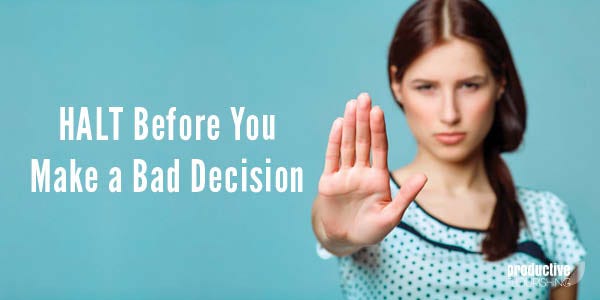HALT Before You Make a Bad Decision

Making good decisions requires you to either override impulses or be able to think through the different aspects of the situation at hand. Doing either of those is typically hard enough, but there are some conditions that make it much harder.
The easy-to-remember mnemonic HALT identifies when you'd want to avoid making decisions. The letters stand for:
Hungry Angry Lonely Tired
I first learned of the HALT mnemonic from a friend in a recovery program. I mentally joined "thirsty" with "hungry" and "sick" with "tired" rather than ruining a particularly good mnemonic. By adding "thirsty" and "sick" to the matrix, I can use it as a reboot sequence, much like what I discussed in 21 Ways to Quickly Short-Circuit a Funk.
Furthermore, we can use HALT to more strategically determine when we should have meetings and/or decision times. Since making decisions can tap into the same type of cognitive bandwidth required to be creative, it makes sense to make decisions during your creative zones.
For instance, making the decision on a new hire or project on Friday afternoon is likely one of the worst times, as you're more likely to be tired and, if not angry, at least more prone to end-of-week frustrations than at the beginning of the week. While decision fatigue is clearly independent of HALT conditions, it's quite clear that they can work in concert. If you're already hungry and tired AND you've got decision fatigue, your chances of either making a decision you regret or wondering whether you made the right decision are much higher.
Most decisions aren't nearly as momentous as we make them out to be. The more the decision matters, the better off you'll be by making it when you're not in the HALT zone. (Tweet this.)


